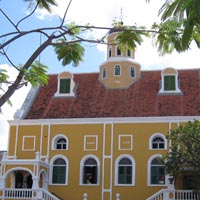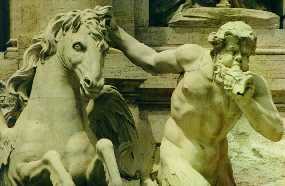
Crown Prince Dragobek II and the newly married Count Kozlowski were acquainted as young men—but an incident 10 years before showed that the prince was less than honourable. The two men meet again after the wedding, with Kozlowski still harbouring a desire to put things right. Now begins a gripping chapter five of The Crimson Garter, by travel editor Stanley Moss, writing pseudonymously as Lovejoy, answering just how the bargain of Grazia’s wedding to Sir Robert Marsh was struck
Chapter 5
Three thousand miles away, on the island of Barbados, night had fallen and a brilliant full moon shone over the tropical forest. Sounds of crickets and drums in the distance filled the darkness. Ynez Sylvain Delacroix López glided in bare feet across the soft Persian rugs, which covered the floor of the vast sitting room, towards the veranda of Maison du Soleil, the greatest plantation house on the isle. On the veranda her husband, Rodolfo López, once known as Vittorio Rosetti, lazed on a wicker chaise, candlelight flickering, which accentuated his dark and handsome features. A nanny named Nené bustled about with a crystal decanter filled with fine cognac. The veranda opened onto a lush, sloping green lawn, beyond which stood acres and acres of sugar cane fields, beyond which could be seen a dark and thick forest, and beyond that the harbour. Vittorio could identify tiny lights miles in the distance below, and the masts of the clipper ships that lay at anchor. He could detect among the perfumes of the night the patchouli, which his wife wore at her throat and wrists. As she approached him silently, the scent announced her presence even before he could see her.
Ynez, you area remarkable woman, Vittorio thought, and you have brought me unimaginable joy. Her family had embraced him at a time in his life when he thought he was lost forever. They had offered him a home in the new world, Père Delacroix had become his second father. He had joined the family business, and Ynez had bestowed upon him a happy marriage and two sons and a daughter. For years he had experienced a delirious happiness he had never expected, tempered only by one obsessive memory: the shadow of his disgrace in the past, which still reached out to haunt him. He deeply regretted the contract he had made so long ago with Sir Robert Marsh, and the fate it imposed on the sister whom he had abandoned. Vittorio could never forget the cold and stern Scottish laird who paid his debts but to whom he had surrendered everything of value that was left. It had been a devil’s bargain.
Ynez’s approach lifted the shadow from his heart and he regarded her handsome features in the candlelight. Her hair was dark and thick and she had let it flow down her back in one long braid. Her skin was the colour of café au lait, and her intense almond shaped green eyes offset a mouth that was wide and generous and filled with laughter. At her ears burned two immense rubies like fire, and at her throat she wore the brilliant diamond pendant which her father had given her at the birth of their first son. Tonight she had chosen a loose and flowing white dress of exquisitely made Burano lace and linen, with a gauze overskirt. At her appearance Nené discreetly left the veranda, for it meant that the children were now ready for bed, and could be brought out to say goodnight to their loving parents.
Before sitting down next to him on the wicker chaise, Ynez bent down and lightly brushed her lips against his glossy black hair. They had time to look at each other only briefly, for then came the delighted voices of children who tumbled onto the terrace, clamouring to gain the lap of their father.
‘Papa!’ cried Bruno, who as the eldest and fastest vaulted on to the coveted lap first. Vittorio took the boy in his arms and kissed him on each cheek.
‘I hope my young Admiral will sleep soundly tonight,’ he said. ‘I see the ships are safely in the harbour.’
‘Yes, sir!’ cried the boy, saluting his father.
‘Me, too!’ cried Paul, clinging to the knee which Bruno had just relinquished. The diminutive Hélène stood to one side, thumb in mouth, clutching a doll, and blinking sleepily in the candlelight.
Vittorio delivered more kisses to all three, and surrendered them to Nené. She reminded them they would have one more chance in the morning to say goodbye to their father before his long voyage. Once calm returned to the veranda, Vittorio and Ynez let the silence between them linger for a while. They gazed out into the night, lost in their own thoughts.
‘I shall be gone so long,’ Vittorio finally said. ‘And I shall truly miss them, as much as I shall miss you.’
‘I know, my darling. But you will finally be able to throw off the ghost that has pursued you all these years.’
The Vittorio Rosetti who sat on the veranda with his elegant Creole wife was a far different man from the young, thin and desperate character whom Robert Marsh had manipulated years earlier. In those days Vittorio had been high-spirited, nervous and often cocksure, the guardian of his beloved sister. After the death of their father, Vittorio had been handed control of a respectable fortune, for which he harboured many dreams. He was not extravagant, simply inexperienced and foolhardy. A number of his father’s friends had been generous with their advice, but Vittorio’s natural stubbornness could not be mitigated, not even by Grazia Rosetti. It was she who allowed Vittorio free rein over the fortune because she trusted him, but also because she was occupied with her own career, which took a great deal of energy and concentration. Nothing could interfere with the passion she felt for her dancing. Vittorio tried to include her in social events, but to no avail. She allowed no distractions from her training.
Eventually an opportunity arose for Vittorio to invest, at an extremely attractive price, in some bonds attached to the development of a canal between Port Said and the Gulf of Suez. The impossibility and heroic nature of the scheme appealed to Vittorio no end. He decided to venture all the available resources of the Rosetti family for the purchase of what he considered to be greatly undervalued bonds.
Grazia, at that time, harboured a dream of going to Paris to study dance under the instruction of Mme Josephine Monitchka, who maintained a residence and a private school on the Rive Gauche. Madame accepted and groomed only the most talented and promising students. The protégées of Monitcka were considered to be exquisite dancers, masters of technique, and many gained a great deal of fame. Some rumours circulated that Monitchka had broken all ties with the best-known of her pupils, Tatiana Stregova, over a mysterious incident in which a young man had figured. But Grazia remained single minded, and no scandal could intrude on her quest to become the finest dancer in Paris. The collapse of the Rosetti fortune, however, enabled Grazia earlier than ever expected, to realize the dream of travelling to Paris and dancing in Monitchka’s school.
When notes came due at a family bank in Rome, Vittorio could not come up with the sum necessary to pay his debts. All of his capital was committed to the Suez bonds, the value of which had dropped precipitously. So Vittorio insisted that Grazia travel immediately to Paris and apply for study with Mme Monitchka. He reasoned that if his sister was away from the pressures of recovering their fortune he would be able to reinstate their position. Neither would suffer the distractions, so he ordered her to leave immediately.
‘I am going reluctantly, Vittorio,’ she told her brother. ‘I trust you always make the best decisions for my future, and I promise to work my hardest so as not to disappoint you, and uphold your confidence. Promise me you will come to Paris to visit as soon as you can! I know the bonds were the correct place to invest our money.’
Vittorio tried to conceal his embarrassment and shame. ‘Your confidence means the world to me,’ he said. ‘I will cherish it. Now the carriage is ready, Grazia. You must climb aboard.’
Grazia Rosetti completed the trip to Paris, and situated with Mme Monitchka, immersing herself in the ballerina’s life. In Rome, Vittorio struggled unsuccessfully to salvage his family’s fortune, as the value of the bonds plunged almost to worthlessness. But Vittorio was not alone in approaching ruin by buying so heavily into the Suez scheme. All over the Continent investors began to panic, not the least of them Sir Robert Marsh, who had committed a small sum, and certainly did not intend for it to disappear so readily into the desert sands. When a cry rose up across the bourses of Europe for action, the Compagnie Suez announced a general bondholders’ meeting to be held in Paris. Both Vittorio and Marsh were among the hundreds of angry bondholders who descended, waving paper, milling about, in a frustrating search for answers that would not come.
Vittorio had written Grazia of his arrival, and arranged to rendezvous with her after the meeting. Her letter of reply was rich in anticipation, enthusiasm and delight, for it had been weeks since she had seen her brother, and she had much to report about her own progress. She also assumed that Vittorio had somehow solved the problem of their finances, and was coming to Paris with news of a happy resolution. The idea of disaster had not occurred to her, yet it obsessed Vittorio, who alone knew the gravity of their position. He dreaded meeting his sister, especially the possibility of having to lie to her.
At the meeting, a chorus of shouts and the sound of gavels landing hard on wooden desktops blended in a terrible cacophony. This went on for hours, in a vast, vaulted room where the air was humid and thick with the overpowering commingling of sweat and dust and other less tolerable human smells. It was an atmosphere of panic and high emotion, where no order was maintained, and raucous brawling erupted and ordinarily dignified people were unceremoniously ejected, where others swooned and fainted from the impossible heat, where tears were shed, and fists were upraised and teeth bared and remarks of the utmost vulgarity and baseness were exchanged. By the end of the day all who attended were exhausted and overdrawn and later that very night some of the unluckiest ones would end their lives, fortifying themselves in a mournful encounter with a bottle, and finally causing their misery to cease at the end of a pistol barrel in a lonely room above some anonymous tavern on a similarly innocuous back street near the Seine.
But it was during this unruly meeting that Vittorio found himself seated next to a strange, reserved man named Sir Robert Marsh, who, like himself, had ventured money on the Suez bonds with the greatest expectation, only now to find himself faced with the possible loss of his capital. It became clear in the course of their commiseration that Marsh had invested far less than Vittorio, in fact it seemed a pittance compared to the magnitude of the sum Vittorio mentioned. The men experienced a camaraderie, owing to their shared outrage at what they viewed as a gross exploitation. Marsh maintained a dour countenance, while Vittorio fell into deeper despair as the day progressed. When finally the meeting adjourned, it became clear that nothing more could be done, that no answers or dates, or sums, and no mention of a buyback was to be made. The disappointed crowd filed angrily out of the gallery, and began flooding the square outside the Compagnie Suez office.
In an almost hypnotic state, Vittorio left in the company of Marsh, near-stumbling down the ornate marble staircase, his heart filled with despair and foreboding. He knew that Grazia would be waiting below. As he descended he said to Sir Robert, ‘My sister is meeting me here. Please, say nothing to her about what has transpired today, since she knows I have come to Paris on important business, and I do not wish to alarm her about our terrible fate.’
To the left of the doorway Marsh spied a beautiful young woman attired in a tasteful fashion, young and pure, radiating an ethereal quality which gave him serious pause. She turned, and as she recognized her brother Vittorio, joy spread across her features. In that moment something strange happened in Sir Robert’s breast. He was seized with a feeling he had never known before, and determined to make better acquaintance of this beautiful creature. Introductions were exchanged, and Marsh heard himself say something so uncharacteristic that later he wondered what unknowable force had made him speak so: ‘Perhaps the two of you would like to join me for dinner.’
Vittorio, determined to do anything to distract Grazia from conversation related to his business, immediately agreed. They soon seated themselves at a satisfactory table close by, where Marsh observed the eagerness and devotion with which Grazia looked at her brother. She asked him what had occurred at the meeting.
‘The news may not be good. We do not know all the facts yet.’ In a desperate glance he appealed to Marsh to pick up the thread of conversation. Marsh, at that moment, was seized by an impulse to protect the fragile creature who now turned her limpid gaze in his direction.
Marsh began to tell her about his life in Scotland, while she regarded him with interest and attention. Her focus upon him both pleased and disconcerted him, as he found himself clumsily but eagerly embellishing. When he spoke about the Scottish winters her eyes widened in alarm. He reassured her that the grates were huge and the fires warm and beckoning at Marshmoor.
‘I possess a library,’ he said. ‘A marvellous, quiet, private place, where the wisdom of the world resides. I have spent years building it, and whenever I go there it gives me a peace which ordinary life does not. The books are my dearest friends, and they always soothe me.’
To Grazia this sounded like a tragic remark from a desperately lonely man. She felt a profound sympathy for his condition. ‘Have you read Dante’s Divine Comedy?’ she asked impulsively, disarming him so much that he admitted he had not. She immediately began to quote one of her favourite passages, and Marsh found her intelligence both quick and startling. He had never before made the acquaintance of an artist, much less a performer, and his surprise heightened as she demonstrated a deeper knowledge of literature than he expected. He spoke to her of his interest in philosophy, and when she responded by mentioning several Greek philosophers it so delighted him that he ventured some of his personal theories based on Presocratic thought, views which he had been developing for years. His mind drifted away into reverie, and when he rediscovered himself he realized she was citing examples from Greek drama, for which she professed a great passion. He ignored the fact that drama and philosophy were so remote from each other, and convinced himself that Grazia Rosetti was a creature fashioned by heaven to satisfy his every desire.
The conversation had easily steered away from the worrisome topics which Vittorio dreaded. It seemed to Grazia that her brother and Robert Marsh must be great and close friends, since Vittorio evidenced so much interest in life in Scotland, the library, and the long-winded discourse the Scottish man gave on how to determine the value of old books. But she politely allowed him to finish, and even regarded it as amusing that he would go on at such length, with such an earnest expression. The conversation, late hour, and anticipation of the next day’s tasks began to bear upon her.
‘Gentlemen, I have so enjoyed our meal,’ she told them. ‘But tomorrow early Madame expects me to be at the barre, and the day which follows will be occupied with hard work and practice. Would it be too much to ask to be excused? A carriage home sounds so good to me right now!’ As she rose from the table Marsh marvelled at her grace, and the dignity of her bearing. It caused him to indulge in a fantasy, which transformed Grazia Rosetti into Grace Marsh, Lady of Marshmoor. By the time Vittorio returned to the table, having located transport home for his sister, Robert Marsh had travelled through his own imagination, spirited her away, married her, and installed her in his ancestral home.
‘You have done me a great service,’ Vittorio gasped, as he deposited himself back into his chair. ‘She has been distracted successfully. But whatever are we to do about these disastrous bonds?’
‘They are nearly worthless I fear,’ Marsh answered sullenly. ‘Tomorrow we will hear more excuses and delays from the Compagnie Suez. If we are lucky, someone will offer us a pittance for them, but it cannot be more than the value of the sheets of paper on which they are printed, alas.’
For the next hour the men sat at the table discussing their options, which were few. Marsh nursed a single glass of red wine, while Vittorio did away with the better part of a bottle of cognac, and soon its effects began to show. He leaned onto his elbow with his eyes half-closed and began to muse aloud.
‘This is a fine condition,’ he whined. ‘I am in possession of a packet of bonds worth pennies. I have ruined my family, lost everything. I have a large debt with my bank in Rome, and now no money with which to pay the interest. I am responsible for the welfare of my sister. My own credibility and possibilities are dubious because of my involvement in this Suez scheme. Perhaps my only prospect is to go to the New World and try to start over.’
Sir Robert Marsh prided himself on his ability to recognize an opportunity, and immediately sensed one with Vittorio. ‘You have my sympathy,’ he replied. ‘This is clearly a case of a decent man defrauded by a grandiose scheme to which even a thoughtful person like myself fell victim. You are not alone. It is in moments such as these that men are bound to each other by higher principles, and heroic actions must be taken, actions which transcend everyday expectation. I see that your heart is noble, and that your dedication to your sister is true. And so a plan occurs to me, by which I can be of help to you.’ The mention of a plan brought Vittorio suddenly back to attention.
‘You have crafted a plan, Marsh?’ he asked. ‘Some idea of how this horrible mess can be remedied?’
‘I am able to pay your bank debt for you,’ Marsh said. ‘That will alleviate your first anxiety. I have no interest in acquiring more Suez bonds. You must instead sign a note to repay me at a healthy—but not extortionate—interest but without a limitation on time. Let us simply agree the note will come due in 50 years. That should give you enough time to resolve your woes. There is the matter of the Rosetti family honour to consider.’
‘It would be better if I were dead,’ Vittorio muttered.
Marsh leaned forward across the table in a conspiratorial way. ‘It could be arranged, you know.’
Vittorio gave off with a ridiculous laugh. ‘You are drunk, Marsh!’
But Sir Robert Marsh maintained his serious demeanour. ‘No. What I meant to say is that in order to protect your family honour we could arrange for it to only appear that you had expired. This will give you the opportunity to work with a clean slate, to rebuild your fortune, to retrieve your family name. I will make it possible for you to leave the country, for no one to know that you are alive. You can make a beginning in the New World, and if you disappear, your sister will not be blamed for your dishonour. If you are able to bear all this upon your shoulders, the way can be found. I will agree to be your sister Grazia’s guardian, until she is of age. And after that I will make sure that nothing harms her. I will marry your sister after an appropriate interval, and I will protect her. You have my word. When you have recovered yourself in the New World you can pay me back what I have lent you, as well as whatever expenses in the meanwhile are needed to insure your sister’s comfort and security before we are married.’
‘You are willing to do all that for me?’ Vittorio asked.
Marsh moodily looked down at his own clasped hands. ‘I too was a young man once.’ He admitted.’ And I know the mistakes one can make.’
‘You are saving my life, Robert. I agree to all of your terms. I swear on my family’s good name that you shall be repaid.’
‘And I promise to help you in every way. Now, perhaps you should compose a suicide letter which I shall myself present to your sister after your false demise. You understand, Vittorio, that if you write such a letter she must believe that you are dead, and so it would be better for me never to reveal the terms of our compact.’
‘My sister will be distraught, crushed. How can I do that to her?’
‘Once you have reestablished yourself in the New World you can make everything right,’ Marsh offered. ‘And think of the joy it will give her. She will not only regain a brother, but a fortune and the return of her family honour.’ These words of hope reassured Vittorio. He agreed to meet the next day to complete all their business. He then bade Sir Robert good evening, hurried back to his own lodgings, and wrote the letter which would seal all of their fates.
Related articles hand-picked by our editors
 Curaçao: on
a higher plane
Curaçao: on
a higher plane
All Caribbean islands offer diving, luxury resorts and deeply discounted
diamonds and designer labels. Curaçao’s rich, multicultural
history, meanwhile, carries the tropical retreat experience to a higher
plane, writes Elyse Glickman
photographed by the author
 Two Parisian hideaways
Two Parisian hideaways
Stanley Moss looks at two distinctive Parisian hotels on opposite sides of town, with very different characters
photographs by Paula Sweet and courtesy Hôtel Le A
 La dolce vita
La dolce vita
The beauty of Roma is not just in the art; it’s also in the food and wine by Fiona Scott
photographed by the author
Advertisement
Copyright ©1997–2022 by JY&A Media, part of Jack Yan & Associates. All rights reserved. JY&A terms and conditions and privacy policy apply to viewing this site. All prices in US dollars except where indicated. Contact us here.